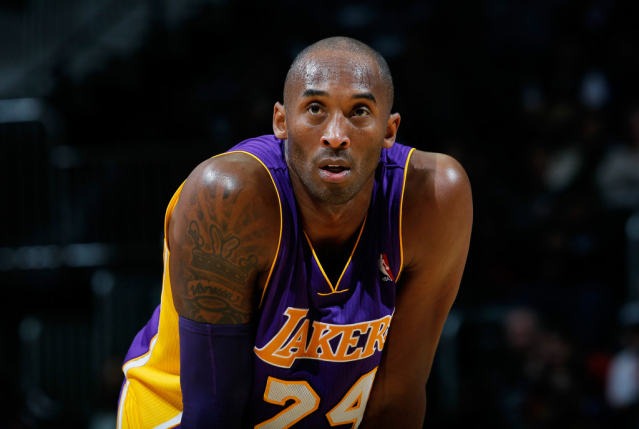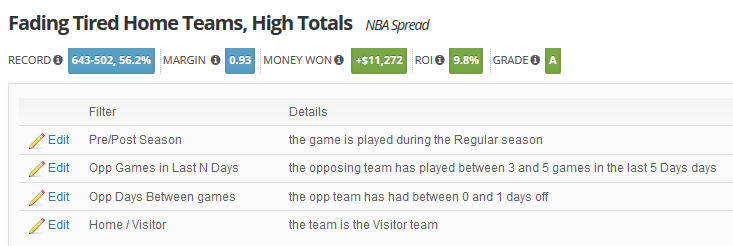
NBA Trends: Fading Tired Home Teams
One of the more common betting strategies discussed by NBA bettors involves the role of fatigue — specifically the impact of playing in back-to-back games. Many bettors believe that oddsmakers overvalue the significance of playing on consecutive nights, while others claim that back-to-back games are only detrimental to a team if they’re playing on the road due to the impact of travel.
Since we subscribe to a contrarian philosophy and tend to go against common perception, our belief was that betting against tired teams would be a profitable betting strategy. Furthermore we believed that oddsmakers would continue to overvalue home court advantage, thus improving our overall edge.
Using our Bet Labs software, we wanted to focus on fading teams who are not only playing in the second night of a back-to-back but also were playing at least their third game in the past five days. Although the system produced a winning record of 1,923-1,845 ATS (51%), it did not win enough to cover the standard juice charged by most sportsbooks. However, when we focused on fading home teams, the record improved by leaps and bounds with a record of 643-502 ATS (56.2%) with +112.72 units won and a 9.8% ROI.
While these results conclusively showed that there was value in betting against tired home teams, we knew there were additional steps we could take to improve this betting system. For starters, we believed that road teams would perform particularly well in games with high totals.
Although historically we have found that underdogs are undervalued in games with low totals, this system contains a large number of past matches on both favorites and ‘dogs. Our hypothesis was that high-scoring games involve a lot of running and gunning and that fatigue would disproportionately affect the already tired home team. This theory was quickly validated by our research.
As you can see we have a direct correlation between an increased over/under and an improved return on investment (ROI). The highest ROI for this system comes when we focus on games with a total of at least 205.5, however, this range has barely over 200 past game matches. For that reason, we believe the optimal range for fading tired home teams comes in games with a total of 194.5 or more. This range has produced a 358-248 ATS record (60.1%) with +93.97 units won and a 15.5% ROI.
In late January, ESPN published an article detailing how home court advantage in the NBA is not as valuable as it once was. This “revelation” is nothing new, as we’ve been discussing how road teams have been undervalued for years now. Nonetheless, this edge is clearly amplified when the following occurs
- The home team is playing on the second game of a back-to-back
- The home team is playing in at least their third game in the past five days
- The over/under is high (ideally at least 194.5)
Bet Labs users are able to copy this system directly from our Think Tank, and bettors are able to view the latest odds and trends from our free NBA odds page. Have any questions for the staff at Sports Insights? Utilize our live chat to speak with a customer service representative or e-mail us at help@sportsinsights.com.
David Solar is the Content Manager at Sports Insights and can be reached directly at david@sportsinsights.com.


john bub
02/05/2015 at 12:07 pmcan you guys tell me the record for this system so far this year? thanks
David Solar
02/05/2015 at 1:50 pmAs of 2/5/15, this system has gone 19-14 ATS (+4.11 units) during the 2014-15 NBA season.
JB
02/06/2015 at 2:20 pmGSW @ Hawks tonight fits the bill.
David Solar
02/06/2015 at 2:47 pmNo it does not. There are no current matches for tonight’s (2/6) games.
jay
02/07/2015 at 4:02 amDid the Suns not qualify for the system tonight (2/6)? They were home against the Jazz, on a back to back, and this was their 3rd game in 5 days..
David Solar
02/07/2015 at 8:50 amThe Jazz did not qualify as a play because the three games in five days filter does not include that night’s game. In this particular instance, the Suns had played three games in six days: Thursday (2/5) at Portland, Monday (2/2) vs. Memphis and Saturday (1/31) at Golden State. In order for the Jazz to qualify as a play, Phoenix would have needed to play on Sunday (2/1) as well.
James
02/06/2015 at 9:05 pmHey David always enjoy these articles you post. I am confused to why there is not a play on the Utah Jazz? I must be misunderstanding the 3 games in the past 5 days? Are you including the game played by the suns tonite as one of the 3 games in the past 5?
jay
02/07/2015 at 6:25 pmNevermind my last post, I meant to ask whether CHICAGO would qualify as a play for this system… I believe BKN qualifies for another one of your systems (road dog with <35% of ATS bets, total under 200, in-conference game)
Jimmy
02/07/2015 at 6:38 pmLooks like the Bulls are no longer a play with the total in their game vs NO dropping under 194.5. Charlotte also doesnt qualify because of a low total (183) and Boston doesnt qualify since they are on a b2b & 3rd in 5 as well.
I believe SACRAMENTO is the only play for this system tonight (as long as the total stays above 194.5)
Matt Meiselman
02/27/2015 at 3:53 amIt really seems like you guys are cherry-picking these trends. If you dig deep enough, there’s always going to be some supposedly magic formula that gives you an apparent edge, merely due to randomness. Why not go about it picking teams by, you know, actually picking teams? It’s a wild overgeneralization to say that all home teams are bad value when they’re “tired”. I expect much more scientific analysis from you guys.
David Solar
02/27/2015 at 1:52 pmWe’re not saying that all home teams are bad value (although they are historically overvalued), but when they’re playing on the second night of a back-to-back and their third game in five days, it makes sense that there would be value to fading these teams. This system has a strong driving hypothesis, consistent year-to-year results and a very large sample size. These are the three main criteria to examine when building a winning betting system.
I’m also not sure what you mean what you say that we would go about picking teams by just “picking teams.” We would prefer to ignore the team names and instead focus on historically profitable trends and systems.
Dave
02/28/2015 at 10:22 pmSince this has been posted the record has been awful. Probably around 7-14 or so.
cant just make up random systems and think they will have success.